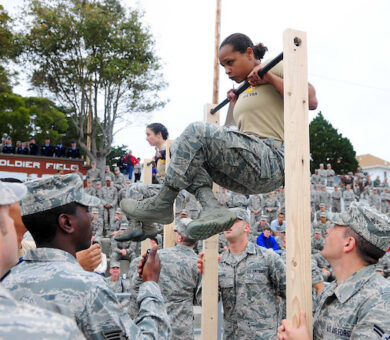5 Tips For Post-game Interviews After a Loss
She walked off the field when time expired and before hitting the locker room was bombarded by the local reporters, who wanted to get her opinion of the game. She was boiling inside with anger because she felt her team did not play their best game, one that was supposed to be an easy win.
As the reporter inches closer to her, she is contemplating what questions she’ll get asked, how she’ll respond to the questions, and how she can overcome her current anxiety about the possibility of saying something wrong.
Have you ever been in this situation? Have you ever been approached by a reporter right after a loss and didn’t know what to say? How did you handle the situation? How did the reporter handle it?
Here are some tips to help you when you find yourself in a situation where you have to speak on behalf of your team, coaches, program, or school after a loss.
Collect Your Thoughts
You don’t have to rush right into an interview if you are still thinking about and/or angry about a loss. If you can take a detour or walk slowly to the interview, it may help you formulate the topics you want to cover in the interview. You can even write some notes on the way to the interview if you have time.
Once I was walking off the basketball court with a former player. We were heading to a post-game interview and she had been picked by the media to come with me. When she spotted the reporter coming straight for us, she turned around, headed back to the bench, and began searching for something. When she caught back up to me, the reporter and I were talking about the game.
Then the reporter turned to the player. After the interview I asked her what she had forgotten. She said “nothing.” She then explained that she needed time to decipher what she was going to say because she knew this particular reporter was going to push her buttons for dirt.
Sometimes reporters will “push buttons” or “pry” for dirt about your team, coaches or opponents. This can be an uncomfortable situation, especially when you feel like you are put on the defense. Being prepared for these types of situations can be helpful.
It’s always good to have a media session with your team and coaches. Ask your coaches to go over some of the possible circumstances where a reporter may ask odd or tough questions. Work together with your coaches on how you should deal with reporters. It’s better to be equipped than to be caught off-guard.
This goes for any interview, regardless of outcome of the game.

Highlight the Positives
There will always be both good things and not-so-good things that occur in competition. No team, or individual, plays a perfect game.
Highlighting the positives is a great way to feel good after a win or a loss, especially when you direct the positive comments outward.
After a competition has finished, think of which players you could highlight for good performances? Even if you play an individual sport, you can compliment teammates on good performance, good quotes or messages they shared, personal bests or just a great effort.
Examples of things you might say after a loss:
About your team:
- We did some great things today, but will continue to work on things we need to improve upon.
- Our team chemistry is so good and we all know what is at stake. I love this team.
- When we do enough good things, we’ll see more wins. Right now we’re focusing on improvement.
- We have great leadership on this team and it will pay off.
- Our attitude was great and we are working well together. Wins will come.
- We’ll learn from our mistakes and get better with each game.
- I appreciate my teammates for all the work, time and commitment we all put into this program.
- Our captains do a great job (even if you are one).
About your coaches:
- Our coaches really prepared us well for this game. We just fell short.
- Coach told us this team would be tough and we knew what we would face.
- Our coaches push us hard and we will deliver wins soon.
- Our coaches will help us correct our mistakes and continue to improve.
- I appreciate my coaches for all they do for us.
About the opponents:
- Our opponent played a great game today. They worked well together.
- So-and-so is a great program and we came into this game knowing it would be a battle.
- We have a lot of respect for this team and so we knew we had to come prepared.
The positives don’t have to land solely on the winning team.
Everyone has positives to applaud and celebrate. Make sure the reporter leaves the interview knowing what your team’s positives are.

Don’t Dwell on the Negative
Reporters may ask questions in a negative way, either extenuating the negative or leaving a question open-ended to see if you will answer negatively. When this happens, just don’t repeat the negative part of the question and answer the way you want to answer it.
If you feel it getting negative, just continue to repeat what you want to talk about. You can also reframe the question in a more positive light.
For example if a reporter asks you why your defense performed so poorly down the stretch causing you to lose the match, you could respond by saying something like:
- Our defense has improved so much. We are excited to continue to improve in this area.
- If our offense scored better, I think there would have been less pressure on the defense. We are working hard to play better at both ends of the field.
- Our defense played so well earlier. We just didn’t sustain it. All we have to do is play a full game.
In these examples, you never restate that your defense performed so poorly down the stretch. You reframe it to sound the way you want it to sound.
Stay Clear of the Blame Game
Some reporters will try to ask questions where the answer blames a teammate, coach or a circumstance for the loss.
Avoid blaming anyone else for a loss. You lost because you didn’t play well enough on this particular day to win. Everyone worked as hard as they could, including all of your teammates and coaches. If they didn’t it will be up to you, your coaches and your team to discuss it when appropriate. It is not for the reporters to print.
Your team is like your family. Protect them as you would your family.

Thank the Reporter
At the end of the interview, thank the reporter for their interest. They will appreciate it and you will gain respect. You will probably also get more interviews as a result.
It’s harder to do post-game interviews after a loss, but that doesn’t mean you shouldn’t do them. Equip yourself with the right tools and mentality to make every interview an advantage for your team.
Be the person your coaches and teammates can depend upon to handle the tough interviews after losses.


